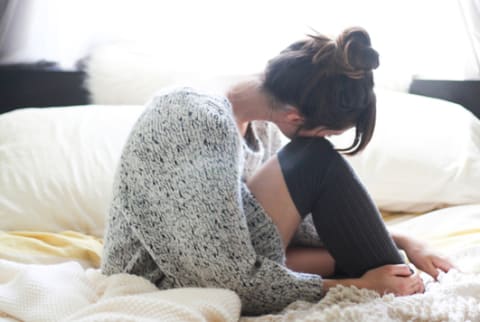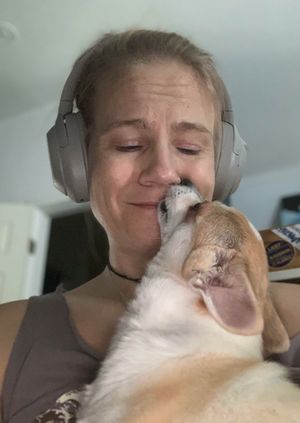Published on MindBodyGreen, November 28, 2016
By Meg Hartley, mbg Contributor
 Photo by Stocksy
Photo by Stocksy
Are you familiar with the Spoon Theory, or the term "spoonie"? If it sounds a little odd, hear me out.
It began when a young woman named Christine Miserandino explained to a friend what it was like to have lupus. They were chillin' at a diner when the friend asked what it was like. Christine gathered all of the spoons from their table and a few more from others, then explained that when you have a chronic illness you only get so many "spoons" per day.
Every tiny thing uses up spoons: doing the dishes, showering, having feelings, getting dressed, ever-y-thing. When you use up all of your spoons for the day, you can borrow from tomorrow—but you will PAY, making tomorrow otherwise worthless, and probably the next day, too. (And if you incite a flare, weeks!)
Another factor for many spoonies is being homebound. I was a public-transportation-lovin' Portlander, walking up my half-mile hill like it was no thang just a year and a half ago—but now that hill might as well be Everest. Other spoonies are homebound due to their conditions alone, lucky to manage even checking the mail.
Being a homebound spoonie isn't fun. It's actually super difficult. It also must be hard for our friends and acquaintances to know what it's like, and hard for them to know how to help or what to do. Here are a few things that I want everyone to know about this sitch:
1. We rest up to see you.
Before I leave the house to the doctor, to see a friend, or anything—I have to lie around for two days to gather my spoons, if you will. I learned this the hard way: by being in public when level "too much to physically function" creeps up. Now I rest up. This is something to be mindful of when making plans with a spoonie.
2. We recover from seeing you.
For two days after I run errands or socialize, I have to recover. I'm currently at a health stage where those things take up all of my spoons, and I have to pay the price for it. (To my homies—it's totally worth it!)
On the few days a month I'm actually able to leave the house, it's not uncommon to hear, "But you look and seem great! Are you sure you're so sick?" It seems innocuous, but most of us spoonies have had to try to convince people that we are physically unwell for years, and a comment like that can really stir up the feels.
3. Getting my diagnosis took years, and I was accused of faking it many times.
It's hard to express just how difficult that was. When your body isn't working and no one can tell you why, let alone how to fix it, it's the most powerless feeling on earth, but then to have to try to prove that you're suffering—it was profoundly deflating.
I've also found that when I act like I'm feeling better than I am I can actually distract myself from the symptoms for a bit and get some shit done. If I have to get through a doctor's appointment and grocery shopping when it feels impossible, staring at the good stuff and forcing myself to engage in a little chitchat is really helpful. It's kind of a "fake it till you make it" approach, and I've gathered that it's a common one. But we're putting on a face to cope—it's harder than we make it look.
4. It's a big financial stress.
Figuring out how to make money when you can't leave the house, or even function much of the time, is incredibly difficult. It's taken me 11 months, and I still don't have a consistent income put together. (Thinking about how chronically ill parents possibly deal with this, man, I can't even…)
It's been a whole lot of hustling for gigs that can be done at any hour from anyplace (whenever my body allows, and from home), and those are really coveted freakin' gigs because who doesn't want that kind of vocational freedom? If you know someone in a situation like this, money is likely to be an issue in their lives, especially if they're just learning how to cope and in a world of medical obligations.
My friends, family, and the badass community that I grew up in gathered together this winter and raised enough money to get me through the scariest part of my life. I can't even begin to express how much gratitude I have to everyone who's helped me this year, I look forward to finding actions, because words just won't suffice.
5. If we ask for help—we're desperate.
Obviously everyone's different, and some people have no trouble asking for help and/or have a badass support network that doesn't require them to. Others struggle with feeling worthlessly small when they have to ask for help, and they only have a few close friends in their new-ish city…. (Hey yo.)
I've gotten the impression that sometimes people feel like they want to do a good thing and so they offer to help or say yes when asked, but they don't fully consider whether they really want or are able to, and so wind up bailing.
It's a really lovely intention, but the thing is when people offer to help and then bail at the last minute—we're screwed. Like as in no food, or no medicine, actual, in really real ways. So please don't offer or say yes to someone in this situation unless you can definitely follow through.
6. Offering help is amazeballs.
When people let me forgo the asking for help part by asking what they can do to help—man oh man, is that just spectacular. I could use help pretty much all of the time. I usually just buckle down and figure out a way to do it on my own, which can get dicey. When someone steps in and they're like, chill, I got this, it's just the best. My neighbor sometimes calls from the grocery store to see if I need anything while he's there, and it just makes my day. Small things go a long way in this sitch!
7. We get really enthused about small things.
When I finally get to leave the house I'm like a child, staring at my beloved city with new eyes, pointing out all of the awesome everywhere. I've gathered from medical ride providers that I appear a bit silly when I do this, but who cares? The world outside my apartment is currently precious and fleeting, and when I get to play in it—I PLAY in it.
8. But sometimes we need to cry our eyeballs out.
I have a family friend who's become wonderfully close over the last six months. She's someone who knows how to hold space, to listen with empathy and without judgment. I know my words won't escape from her mouth to others' ears. Being able to call her and let those feels out has truly been a lifesaver.
Samesies for others who've seen me at my absolute worst, my most desperate, and yet still come 'round all full of acceptance and kind words. They make me feel safe. Like I'll make it. It's so precious. When human contact is rare, the desire to try to make it a wholly positive experience can be overwhelming, so providing a spoonie with a safe space to release the bad feels is an ENORMOUS help.
9. A text message is not a phone call.
This winter I went over two months without hearing the voice of a beloved human. I'd call people, but they'd text back. I used to be the same way—I totally get it—so I didn't want to pester anyone, but it was desperately lonely. (Yet my Facebook was blowing up! It's a strange world we've made ourselves here.)
10. But a text message is better than nothing.
So many people from all over have been checking in on me throughout this journey, and it's meant the world. I remember how crazy life is out there, and it's heartwarming to know I'm thought of and that they took the time to express it.
11. Because sometimes it feels like we could just disappear.
When you're alone so often, and especially during stretches like in No. 6, it feels like you've already vanished—and the world's just fine without you. It can feel like you don't matter. I've learned to create some semblance of community, and that's helped lots, but those feels still haven't quite gone away.
So love on your spoonies, people. This is hard. It's harder than we make it look, and we'll probably never actually divulge just how hard it is. (Health issues are often embarrassing.) Before all of this, I remember sometimes whining about not having something I wanted, then rolling my eyes and sarcastically saying, "At least I have my health"—like it didn't even count.
Never. Again.
